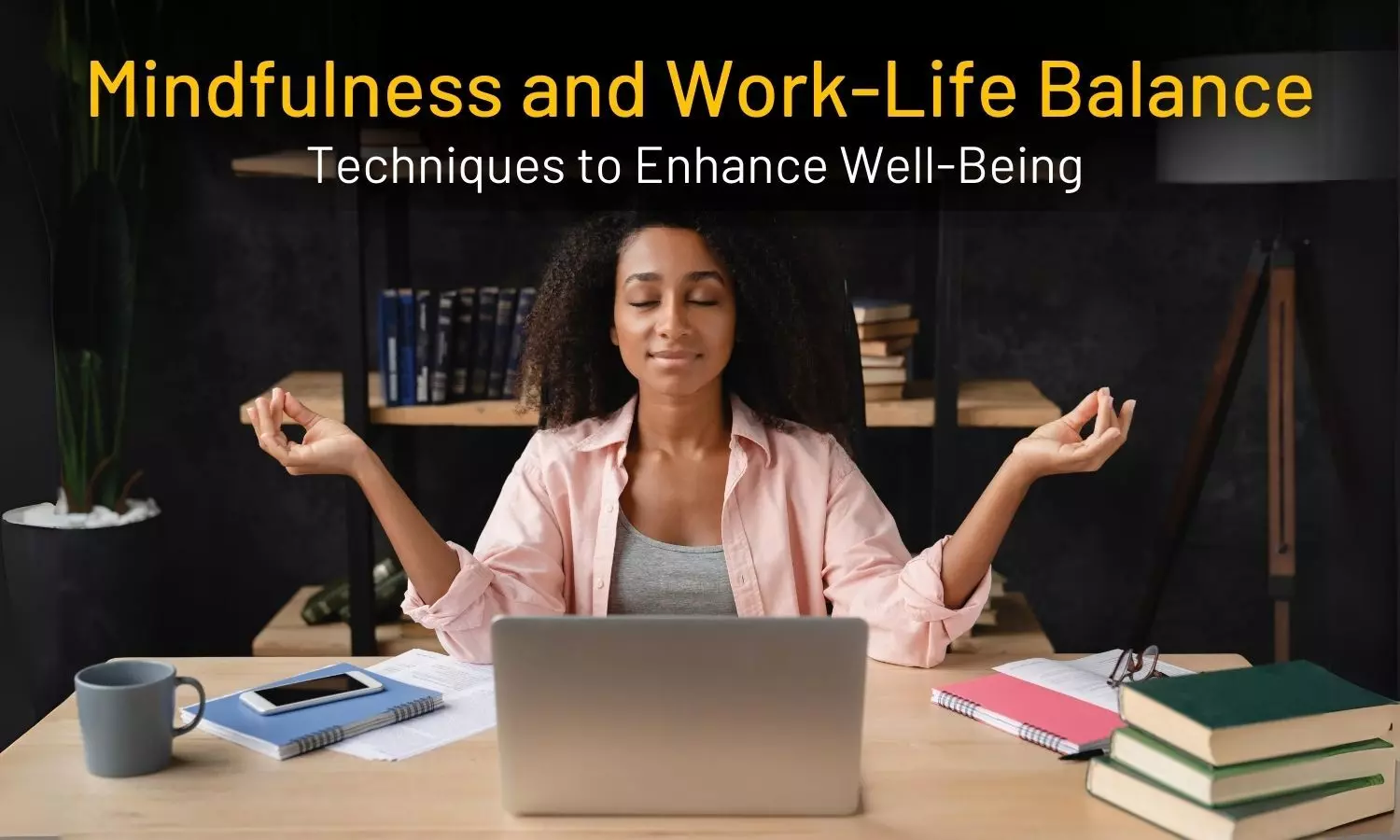Mindfulness for Work-Life Balance: Stress Reduction & Well-Being Tips

Discover mindfulness tips to improve work-life balance, reduce stress, and enhance overall well-being.
A healthy work-life balance seems difficult to achieve in today’s fast-paced world. We all have busy lives filled with work tasks, personal goals, and family commitments. But how do we ensure that we’re not overwhelmed? How can we stay productive while also taking care of our well-being?
This is where mindfulness steps in as an effective tool for achieving work-life balance, reducing stress, and enhancing overall well-being. In this article, let us explore how mindfulness techniques can help manage the pressures of daily life and foster emotional resilience, mental health, and personal growth.
Understanding Mindfulness
Have you ever felt overwhelmed by your tasks or distracted during meetings? How often do you take a moment to breathe deeply and focus on what you’re doing right now?
Mindfulness is all about being present and aware in the moment. It helps us manage stress, improve focus, and enhance our overall well-being. Imagine being fully engaged in your work, not worrying about yesterday’s deadlines or tomorrow’s meetings. Wouldn’t that feel great?
By practising mindfulness, we can create a healthier, more productive workplace for ourselves and our teams. It not only helps with stress reduction but also helps to manage the pressures of daily life and foster emotional resilience, mental health, and personal growth.
Benefits of Mindfulness
1. Stress Reduction: Mindfulness helps to manage stress by encouraging awareness of our emotions and thoughts, allowing us to respond thoughtfully instead of reacting impulsively.
2. Improved Focus and Concentration: By training your mind to stay present, you can enhance focus and reduce distractions, which are essential for productivity.
3. Fosters emotional resilience: Mindfulness practises can help you become more emotionally resilient, allowing you to manage feelings of anxiety, anger, and frustration more effectively.
4. Enhanced Well-Being: Mindfulness can contribute to a sense of peace, contentment, and personal growth, supporting a healthier work-life balance.
5. Work-Life Integration: Rather than constantly separating work from life, mindfulness promotes a sense of harmony between the two, improving overall well-being.
Importance of Work-Life Balance
Achieving a proper work-life balance is critical for maintaining good physical, mental, and emotional health. Stress from work can spill over into your personal life, affecting relationships, hobbies, and downtime. On the other hand, neglecting work responsibilities can cause career stagnation, financial stress, and decreased job satisfaction. Striking the right balance is essential for maintaining both professional success and personal well-being.
Signs of Poor Work-Life Balance
- Chronic stress and anxiety
- Finding it difficult to relax during time off
- Burnout or constant exhaustion
- Strained relationships with family or friends
- Lack of interest in hobbies or personal growth
If you notice these signs, it may be time to evaluate your time management, workload, and personal priorities.
Mindfulness Techniques for Work-Life Balance
Practising mindfulness in your everyday routine can be simple and effortless. There are several practical techniques you can practice, even when you have a busy schedule.
1. Mindful Breathing
Mindful breathing is the simplest technique one can follow. Here's how to practice it:
- Sit or stand comfortably.
- Close your eyes and breathe in deeply, letting each breath flow slowly and calmly.
- Pay attention to the feeling of the air as it flows in and out of your body.
- Whenever your mind drifts, kindly guide your focus back to your breath.
Benefits: This practice can be done anywhere, from your desk at work to a quiet space at home. It's excellent for anxiety management and provides an immediate sense of relaxation.
2. Body Scan Meditation
A body scan meditation involves paying attention to different parts of your body to notice areas of tension or discomfort. Here's how:
- Lie down or sit comfortably.
- Close your eyes and start by focusing on your toes, working your way up your body.
- Observe any sensations—tightness, warmth, or relaxation—and breathe into those areas.
Benefits: This technique enhances your mind-body connection, promotes holistic wellness, and helps release physical tension built up during the day.
3. Setting Healthy Boundaries
Mindfulness also involves recognising your limits and establishing healthy boundaries in both personal and professional life. This could mean:
- Declining extra tasks when you're already overloaded with work.
- Designating dedicated time slots for both work and personal tasks.
- Prioritising self-care practices, such as exercise, reading, or spending time with loved ones.
Benefits: Setting boundaries ensures that your time and energy are spent on what truly matters, reducing the risk of burnout and improving workplace wellness.
4. Gratitude Journaling
Gratitude is a powerful mindfulness tool. Keeping a gratitude journal allows you to focus on positive experiences and emotions, fostering a sense of contentment.
- Before going to bed, write down three things you're grateful for.
- Reflect on why they made you feel good and how they positively impacted your day.
Benefits: Practicing gratitude increases emotional resilience and promotes a more balanced, mindful life.
How Mindfulness Supports Work-Life Balance
1. Increases Focus and Productivity
2. Reduces Stress and Anxiety
3. Promotes Emotional Resilience
4. Enhances Decision Making
5. Improves Relationships
Self-Care Practices for Stress Reduction
Incorporating self-care into your routine is essential for reducing stress and maintaining a work-life balance. Here are some self-care practices that complement mindfulness:
1. Exercise and Physical Activity - Physical activity is a proven way to reduce stress and improve mood. Whether it's yoga, walking, or hitting the gym, regular exercise promotes mental health and physical wellness.
2. Eating Healthy - Nourishing your body with balanced, nutritious meals can enhance your energy levels, focus, and emotional well-being. Mindful eating, savouring your food and eating slowly can also help reduce overeating and improve digestion.
3. Proper Sleep - Prioritise quality sleep by establishing a bedtime routine. Create a peaceful environment, limit screen time before bed, and practice relaxation techniques, such as deep breathing, to wind down.
Mindfulness is an invaluable tool for achieving work-life balance, reducing stress, and enhancing overall well-being. As you wrap up your day, think of how mindful you have been in balancing work and personal time. Did you take a moment to pause and breathe today? Reflect on how mindfulness can help you stay present.
Make mindfulness a habit, and experience the benefits it can bring to your mental health and work-life balance.



















